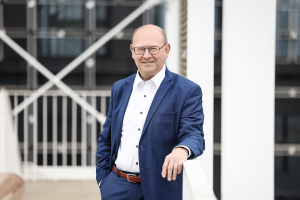Prof. Philippe Hiligsmann has joined the University as the new Vice-rector for Academic and Student Affairs. With a career marked by his commitment to students and teaching, he brings his expertise in academic leadership and innovative approaches to education.
Prof Hiligsmann joined Uni.lu from UCLouvain, where he served as Vice-rector and Professor of Dutch language and linguistics.
The change of leadership is marked by a subtle, but important change: the position of Vice-rector for Academic affairs has become Vice-rector for Academic and Student affairs, underlining the role of students in the University’s education policy. In his first interview, he provides a taste of what is to come.
In our first interview, we tackle his vision of a holistic approach of teaching, learning and student engagement.
Could you tell us a bit about your background?
I’m Belgian, and I studied at the University of Liège, where I also conducted my Ph.D. specialising in the learning of Dutch as a second language. For those who are not familiar to Belgium, there are three official languages, French, Dutch and also German! Later, I had the opportunity to take a position at the University of Lille.
In 2001, I moved to the University of Louvain-la-Neuve (UCLouvain), where I held several positions, including department chair, dean of a faculty and vice-rector for student affairs. I am very pleased to start a new chapter at the University of Luxembourg.
What are your plans for enhancing academic programmes and student services?
In overall, I firmly believe that our decisions should be rooted in scientific research, existing best practices in higher education institutions, and surveys conducted among students and alumni.
Developing new interdisciplinary programmes is a very important issue in 2024, and I hope to do so the coming years in collaboration with the faculties and research centres. I’m also looking forward to fostering stronger connections between initial training, continuing education, and lifelong learning.
As Vice-Rector for Student Affairs at UCLouvain, my focus has always been on student service.
‟ For me, being a professor means not only educating students academically but also supporting their growth outside the classroom. In a sentence: the person as an individual needs to be at the centre of education.”
Vice-Rector for Academic and Student Affairs
In 2024, student support extends to include culture, sports, social development, and, of course, professional integration at the end of their studies. I’m eager to bring this approach to the University of Luxembourg.
What is your vision for enhancing student engagement at Uni.lu?
My goal is for every student graduating from the University of Luxembourg to be able to say, “I’ve spent four enriching years here, not just academically, but also personally and socially.” I want to strengthen all aspects of student life – community-building, fostering connections through multilingualism and multiculturalism – because these elements contribute to students’ overall fulfillment.
I want our students to leave the university enthusiastic about promoting their experience to prospective students, encouraging young people to study here.
In line with improving the overall student experience, let us address student well-being.
During my time at UCLouvain, I worked with my team on student engagement, which wasn’t just about academic involvement, but also participation in extracurricular activities – student societies, associations, and so on. We surveyed graduates to assess the impact of this engagement on their socio-professional integration and development of cross-disciplinary skills.
The results showed that more than 50% of students felt a positive impact on their social networks and sense of inclusion, which contributed to their mental well-being. In addition to mental health, this extracurricular involvement positively influenced academic integration and success, and the support network persisted beyond their studies.
What role can digital tools and AI play in personalised learning and student experience?
Today, all university students are familiar with tools like ChatGPT. It’s crucial to guide their usage to ensure that we preserve aspects of learning that are distinctly human, such as critical thinking and creativity. Artificial intelligence should remain an instrument, not a replacement for human interaction, originality or reasoning.
In addition to research projects on the impact of AI in teaching and learning, a new Education Innovation Fund will be launched to support innovative education initiatives by teaching staff, directly contributing to the improvement of teaching practices and the student experience.
What do you consider your key priorities for your first year as Vice-rector?
In my first year, my priority is to familiarise myself with the people I’ll be working with.
If I had to define three or four priorities for this first year, they would be: First, to develop a student life policy; second, to initiate some interdisciplinary course programmes I’d like to implement by next year; and third, to identify administrative processes that could be improved. I’m sure I’ll uncover more areas as I go along.
